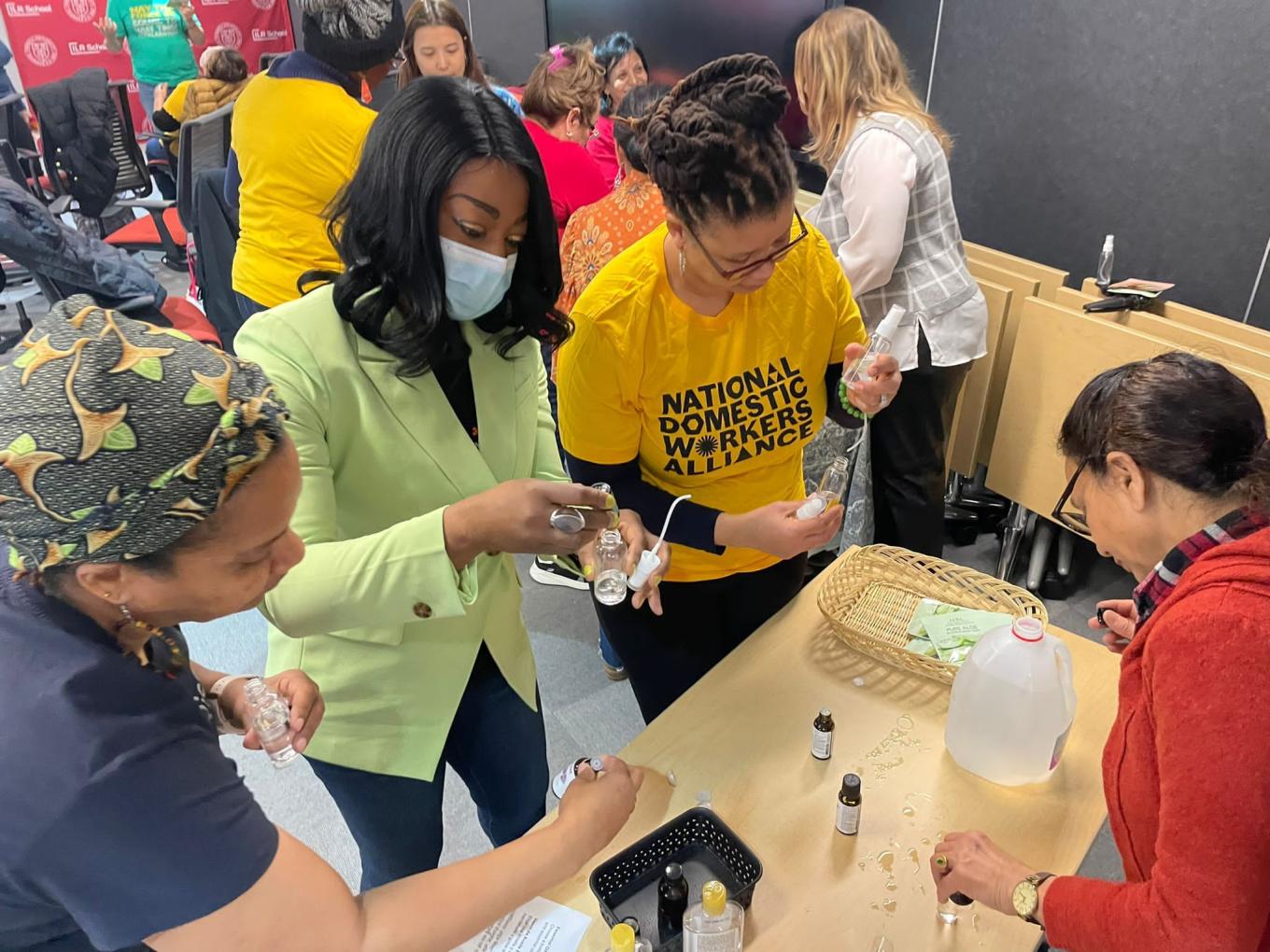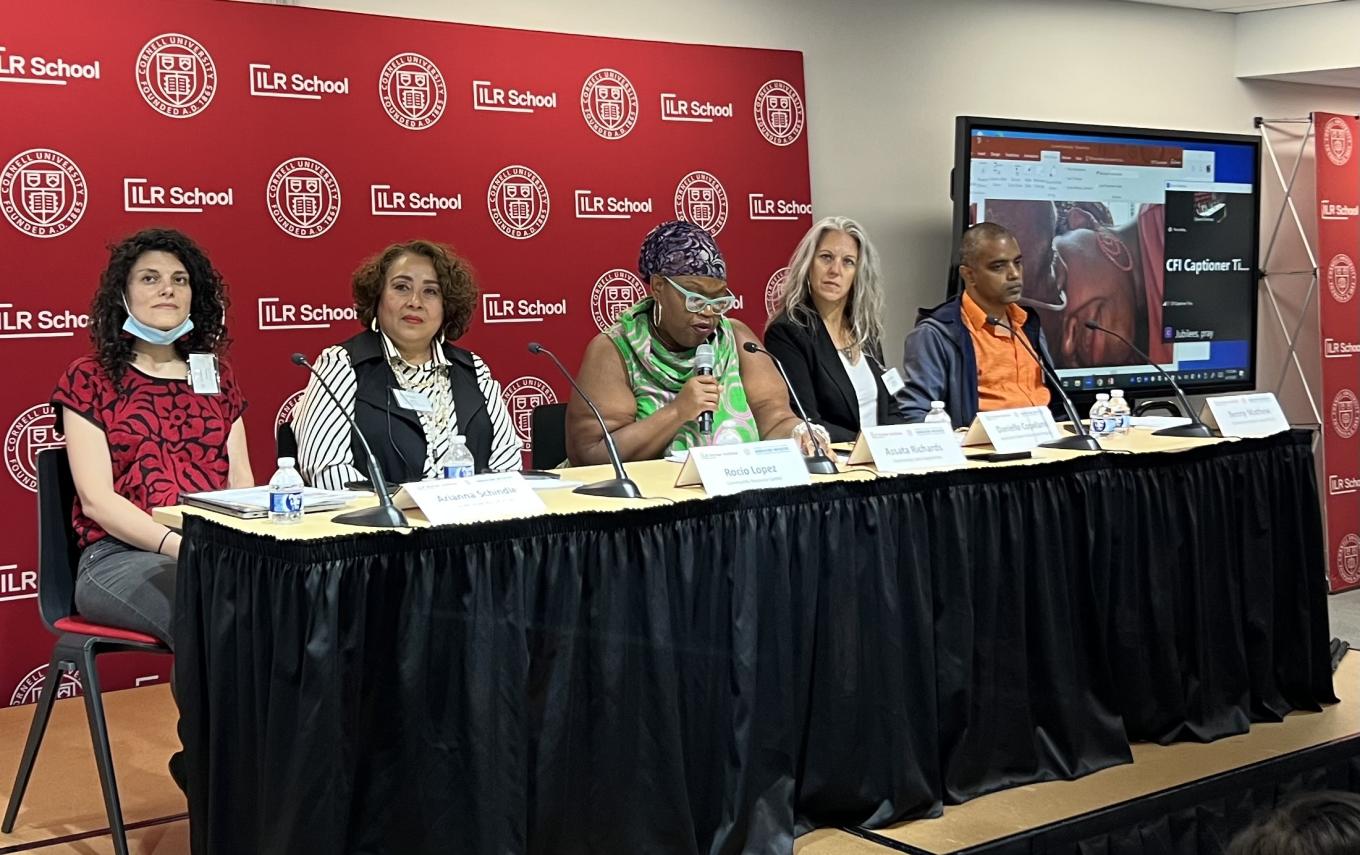The Worker Institute’s Future of Care Work Initiative explores the widely devalued, underpaid, and too often difficult, degrading working conditions of care economy jobs. Care workers often face significant stress and trauma in these jobs, and yet face barriers to accessing care themselves. The Future of Care Work advances the needs, voices, and experiences of care workers themselves, identifying long-term solutions that value their labor with good wages and dignified working conditions. We do this through training, convenings and research.
Training
Regenerative Organizing: Training to Support Care Workers' Holistic Wellbeing
This project aims to address the stress and trauma that care workers may experience due to the nature of their work and their position as a workforce that is devalued and made up disproportionately of women, people of color, and immigrants. A cohort of care workers and staff from their unions and worker centers are participating in a training and coaching program to design and implement a set of “regenerative practices” that are tailored to their organization/union and the needs of the members. Regenerative practices include a range of tools that emphasize collective practices such as “regeneration circles,” a peer support method for collective care. We will document and analyze this training program in a research brief on regenerative practices for care workers and their unions/organizations.
Care Forward-Stewards Raising Initiative
Care Forward leverages the power of community to raise standards for domestic work at the neighborhood level. We do this by creating a framework for domestic workers and employers to engage in ongoing dialogue and negotiation around pay and other conditions; developing campaigns that raise awareness and enforcement of existing rights/laws and working to create domestic work standards for the neighborhood by coordinating a community standards board with workers, employers, and allies.
We Rise Nanny Training Program

In response to the challenges domestic workers face (low hourly pay, wage theft, no overtime pay, and insufficient benefits such as paid leave or health insurance), in 2010 New York State passed the Domestic Workers Bill of Rights that enshrined into law important rights and protections for domestic workers. Yet, as in other industries where precarious workers have secured new legal rights, it can be hard to enforce the rights guaranteed by law—especially when enforcement happens in the privacy of people’s homes. To make these rights meaningful, workers themselves have to be empowered to enforce them. The We Rise Nanny Training Program was created as a worker training and education program to inform workers of their rights and to strengthen workers’ ability to advocate for themselves.
Convening
2024 Future of Care Work Convening: Forging Connections Across Care
Bringing together advocates, care workers, labor leaders, scholars, and organizers, the 2024 Future of Care Work Convening placed care workers' needs and voices at the center of discussions on the future of care work. The 2024 speakers, panels, and action sessions focused on care as a public good, innovative examples of raising standards across care sectors, and how to build connections across care providers and recipients and paid and unpaid care work.

2023 Future of Care Work Convening: Taking Care of Care Workers
The 2023 Future of Care Work Convening brought together advocates, care workers, labor leaders, and scholars to build power for care workers and lift standards in the care economy by putting public focus on the urgency of taking care of care workers. Care workers often face significant stress and trauma in their jobs, and yet too often face barriers to accessing care themselves—a problem made starkly visible during the Covid-19 pandemic. The 2023 convening placed the needs, voices, and experiences of care workers themselves at the center of the public and policy discussions on the future of care work to explore how we can take care of care workers.
Research
Financialization and Structural Racism in Home Care: The Intersection of Quality Work and Quality Care
Funded by the Robert Wood Johnson Foundation, this 18-month research project explores the impact of financialization on workers in the home care industry. Given what we already know about the poor pay and working conditions that home care workers face—and the fact that these jobs are disproportionately held by women of color—our research examines whether, and if so how, the incursion of private equity into home-based care exacerbates these already challenging working conditions—reinforcing structural racism. Furthermore, our research will examine how any changes in the quality of work may affect home-based care workers’ ability to provide quality care to their clients. The research will be carried out with the support of a Research and Advocacy Advisory Committee comprised of labor and community-based organizations, home care workers, advocates, and researchers.
The Law's Governance of Home Care Work
In collaboration with Professor Yiran Zhang, this research project uses qualitative interviews with home care workers and advocates to better understand how the legal system governs the home care provided through the Consumer-Directed Personal Assistance Program (CDPAP). In New York State, much of the recent growth in home care jobs has been through CDPAP, where paid caregivers may have existing relationships with the care recipients. This project proposes to understand how the law and other institutional factors shape home care workers’ experience of working time, their care relationships, and models of advocacy and organizing, with a specific emphasis on those working through the CDPAP program. By understanding how the existent law works for home care workers and care work organizing, this project also aims to identify what law and policy reforms can empower home care workers and improve the work of home care.
Domestic Workers Rising: Improving the Working Conditions of Nannies through Peer Education
The Worker Institute carried out an 18-month mixed-method evaluation of the We Rise Nanny Training program, shaped by the principles of community-based participatory research, with the following objectives: to understand the degree to which the program had a meaningful impact on domestic workers’ workplace conditions; to better understand the impact of the training on nannies’ leadership development; and to better understand how the design of the We Rise program enabled its success or pointed toward challenges.
